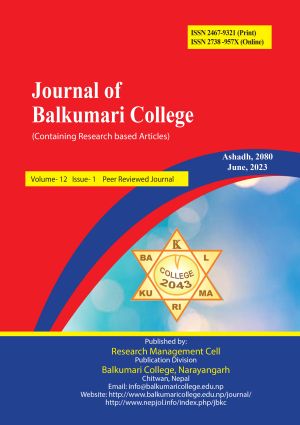Evaluation of antimicrobial activity of Crude Ethanolic Extracts of Selected Spices
DOI:
https://doi.org/10.3126/jbkc.v12i1.60424Keywords:
Spices, Ethanol extract, Antimicrobial activity, AntibioticsAbstract
Infectious diseases and food poisoning caused by microbial pathogens continue to pose significant threats to global public health. In this context, the antimicrobial properties of certain spices have garnered attention due to their historical use not only for culinary purposes but also for their medicinal value. This study aimed to assess the antimicrobial activity of crude ethanol extracts obtained from a selection of spices, including clove, cinnamon, cardamom, fenugreek, cumin, and ajowan against several pathogenic bacteria, namely Klebsiella pneumoniae, Staphylococcus aureus, E. coli, and Pseudomonas aeruginosa.Results indicated that among the six tested spices, clove exhibited the highest antimicrobial efficacy, with no-table inhibition zones of 23mm against E. coli, 20mm against Klebsiella pneumoniae, 32mm against Staphy-lococcus aureus, and 16mm against Pseudomonas aeruginosa. Cumin demonstrated considerable antimicro-bial activity with inhibition zones of 22mm, 14mm, 29mm, and 20mm against E. coli, Klebsiella pneumoniae, Staphylococcus aureus, and Pseudomonas aeruginosa, respectively. Ajowan, cardamom, and cinnamon also displayed varying degrees of antimicrobial efficacy against the tested bacterial strains.On the other hand, fenugreek showed weak antimicrobial activity, as it failed to inhibit the growth of any of the four bacterial isolates. The findings suggest that spices such as clove, cumin, and cinnamon possess promising potential as natural remedies against pathogenic bacteria, providing a safer alternative to traditional antibiot-ics. Additionally, these spices could serve as natural preservatives in various food and healthcare applications.




